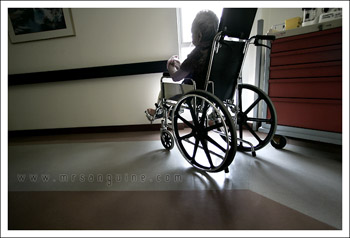Blaming Seniors for the High Cost of Health Care.

Eighty percent of seniors say they would like to die at home. Seventy-five percent die in medical facilities.
Despite endless studies that show seniors suffer when they are given futile care, our medical delivery system funnels them into aggressive, excessive treatments that do little or nothing to prolong life and harm their emotional and physical well-being in their last months.
But when seniors are informed of their care options and given a choice of how and where they die - in essence, when they are given the chance to honor their own consciences - the costs of elder care, emotional and physical, decline sharply.
Today's column by David Brooks assigns blame for the high costs of end of life care to the wrong party: seniors. The future of health care, he declares, is a senior movement that tackles "the cause of nonselfishness."
As Ezra Klein rightly notes, it's not seniors' selfishness that is consuming 2/3rds of the Medicare budget, but doctors':
I'm not being flip. I can make a pretty good case for payment reforms that would encourage doctors to provide fewer treatments. I can make a pretty good case that seniors in many states should go to the doctor far less often than they do. But people err when they imply that individuals have the power in the medical relationship. We go to the doctor and we listen to what the doctor says. A sick senior in Minnesota costs a lot less than a sick senior in Florida, but that's not because the Minnesotan is refusing treatments. It's because his doctor is providing fewer of them. If you want to talk about a group with real power to change medical spending in this country, talk about doctors.
Take Klein's Minnesotan and let's call him Charlie. Charlie's been through numerous chemotherapies and treatments over the past 5 years for cancer. But after a long, brave fight, his doctor knows that Charlie's got only about 5 months to live. Rather than discuss the exhausted options, the 5 month prognosis, a living will and plans for death, Charlie's preferred site of death, and other end of life issues, Charlie's doctor instead gives him the hope that a new, very expensive drug may extend his life. Charlie is kept in the hospital, Medicare pays for the experimental drug that is proven to extend life a few months in 5 to 10% of patients, Charlie's family visits daily with the hope that he will recover. Seven weeks after starting the new drug, Charlie lapses into a coma; two weeks later, he dies.
Doctors have traditionally shied away from discussing end of life care with patients for a host of reasons including: lack of training in how to broach the subject; the lengthy discussions that prepare a patient for death are often not reimbursed; and doctors frequently view the inability to cure a patient as a failure. As a result, dying patients are seldom accurately informed of their prognosis nor given the information and resources necessary to prepare. And patients fail to initiate these conversations because they look to their doctor for information and guidance. If the doctor can't broach the subject of death, how should the patient?
Yet taking on the failings of an ill-prepared medical industry is much less popular than blaming seniors for their selfishness. We look at medical professionals as authorities, paternalistic experts whose practices shouldn't be challenged. And we have come to view hospice or palliative care - options that work to keep a dying patient as comfortable as possible in a non-hospital facility or their home - as giving up on life.
If asked, Charlie may well have said that he wanted every possible treatment, no matter how long the odds were for his survival. But he may also have said that after five years of struggle against an incurable disease, he was ready to go home, to make his informed last decisions, to prepare for death, to die with his family surrounding him. Either way, it would have been Charlie's choice. Instead, his doctor "sheltered" him from such decision-making. And in the course of doing so, deprived him of a peaceful home death.
Klein's right. Until doctors - who have the ability to direct the nature of our last months and to inform us of what is coming and what our options are - address end of life care with patients, seniors will continue to die in ways and in places that they would never have chosen. At a cost that none of us should bear.
Labels: end of life care, futile care, hospice, palliative, patients' rights


2 Comments:
As long as the health care industry is set up and geared as a "for profit" industry (instead of a proactive health industry), the whole concept of honoring an elder patient's concept and definition of "quality of life".
I speak from experience and even though it was difficult to accept (as the child), my mother was cantankerous to the very end about her quality of life versus the medical establishment's desire to keep her alive beyond that definition.
Hi Anonymous,
I would love to hear your opinions on how the power structures (medical industry, the church, the state) play a role in pushing terminal and elderly patients toward futile care.
Against such forces, how do we make medicine not-for-profit? Or how do we regulate the industry?
And how do we work toward better definitions of "quality of life" and "natural death"?
Post a Comment
Subscribe to Post Comments [Atom]
<< Home